Bruxism: Teeth Grinding | Clenching at Night | TMJ Disorder | TMJ Dentist in Vadodara
Teeth grinding can be a commonly involuntarily involuntary response to stress and anxiety. Some people react differently throughout and grind their teeth all day despite not responding to immediate stressors. It is called bruxism, when you grind your teeth or grind on a tooth involuntarily.
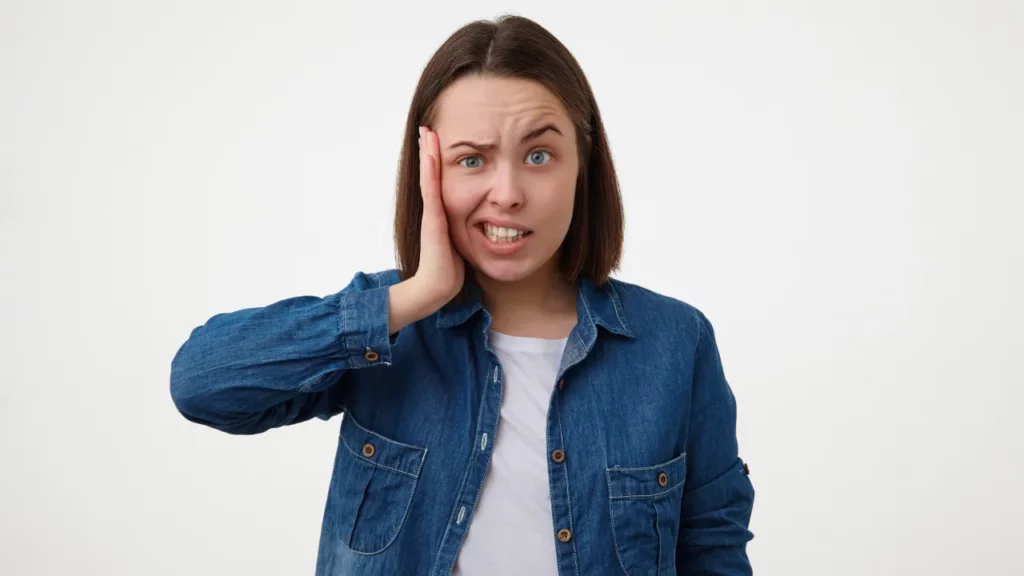
Types Of Bruxism
Awake Bruxism
It’s usually tied to emotional issues. Feeling anxious, stressed or angry can lead to teeth grinding.
Sleep Bruxism
It’s usually tied to emotional issues. Feeling anxious, stressed or angry can lead to teeth grinding.
How Common Is Sleep Bruxism?
Bruxism in sleep is more commonly seen in young adults than in adults. It’s hard to determine exactly which people have sleeping bruxism as some people don’t even know they grind their teeth against them at night and aren’t sure. Statistics of sleep bruxism are difficult for children. Studies have shown 6% or more children have night-time teeth grinding.
The problem is most often diagnosed when a child gets his or her teeth brushed out and may cause jaw pain in some babies and toddlers. Some sleep problems, such as talking, walking, or sleepwalking, have increased the chance of sleep bruxism in children.
Symptoms Of Bruxism
, may include:
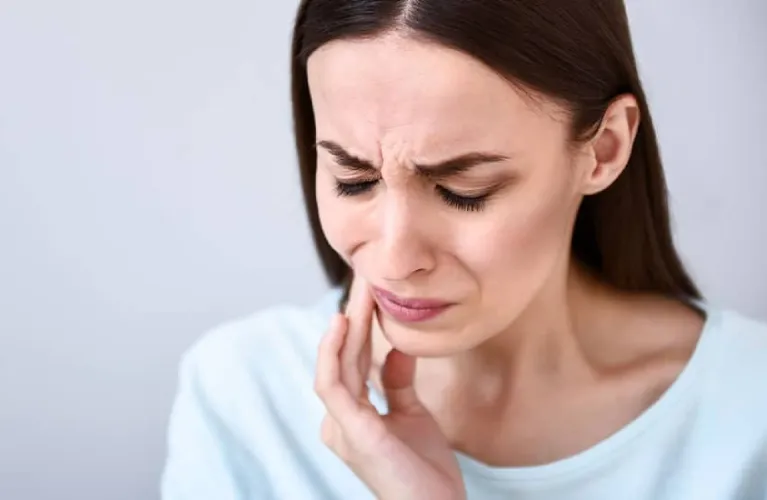
Jaw clenching:
People with bruxism may frequently clench their jaws, either during the day or at night. This can lead to jaw pain, muscle tension and discomfort in the upper jaw area.
Teeth grinding:
This is the primary symptom of bruxism. It often occurs during sleep, but it can also happen during wakefulness. Grinding can produce a loud, grinding or scraping noise that may disturb a partner or family members.
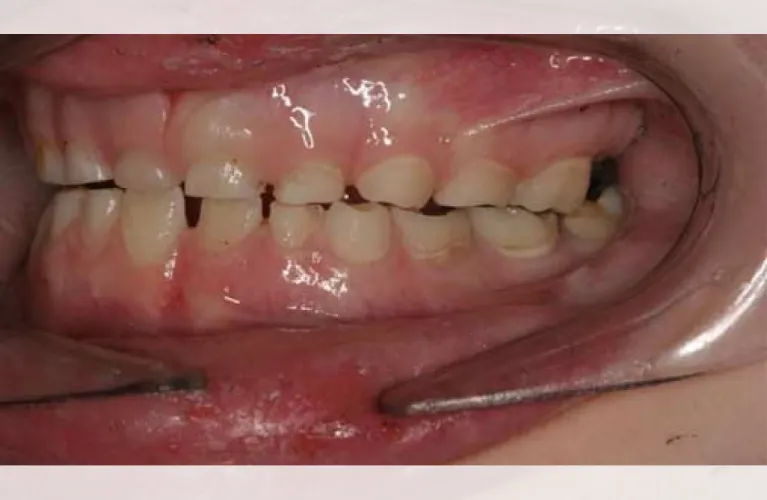
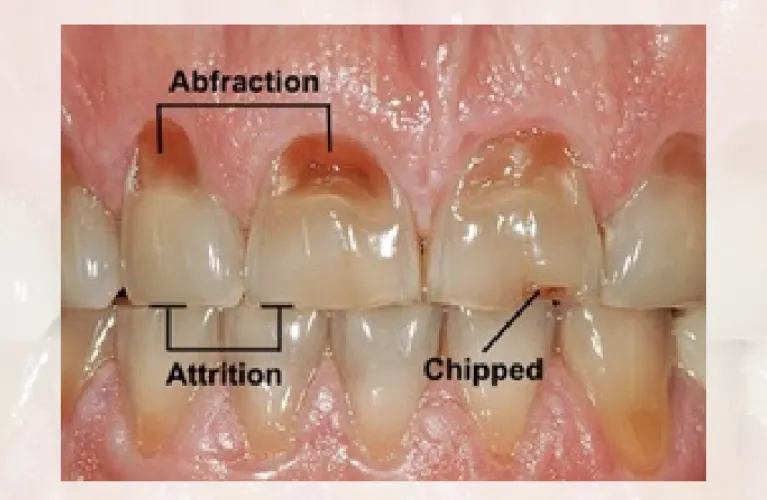
Tooth sensitivity
Bruxism can cause increased tooth sensitivity to temperature changes, pressure, or certain foods. This is because the grinding action can wear down the protective layer of enamel on the teeth, exposing the more sensitive dentin underneath.
Headaches
Frequent headaches, particularly in the temples or the sides of the head, can be a symptom of bruxism. The muscle tension and strain caused by teeth grinding can lead to headaches, including migraines.
Facial pain
it can cause facial pain, especially in the jaw, cheeks, or around the ears. This pain may be dull and constant or intermittent and sharp.
Jaw muscle stiffness
Bruxism can result in tight, tense, or fatigued jaw muscles. You may experience stiffness in the muscles of the jaw, making it difficult to open your mouth fully or move it freely.
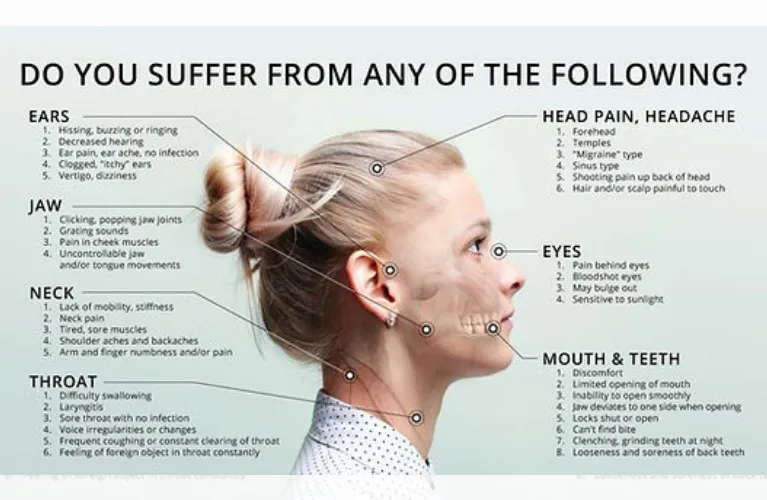
Earaches
Some people may experience earaches or a feeling of fullness in the ears. This is because the temporomandibular joint (TMJ), which connects the jawbone to the skull, is near the ear.
Disrupted sleep
it can disrupt your sleep patterns, causing you to wake up frequently during the night. It can also lead to other sleep disorders, such as sleep apnea or snoring.
Worn-down baby teeth
Over time, wear down the enamel on your child’s teeth, leading to tooth damage, including chipped, fractured, or flattened teeth. You may also notice visible notches or grooves at the gum line.
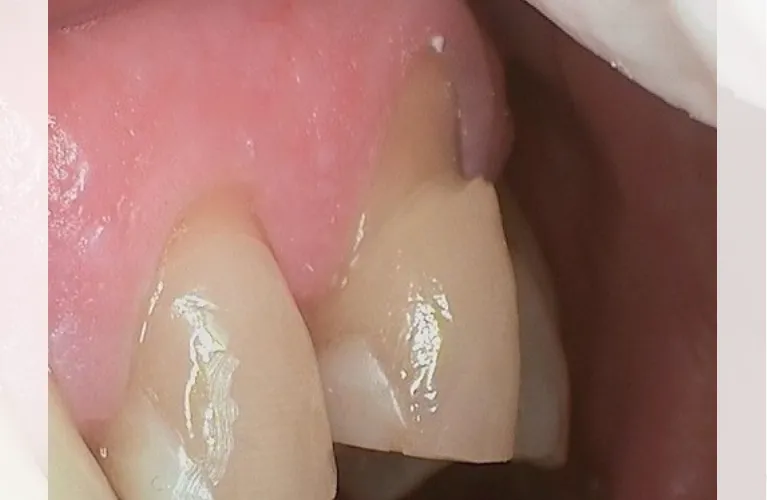
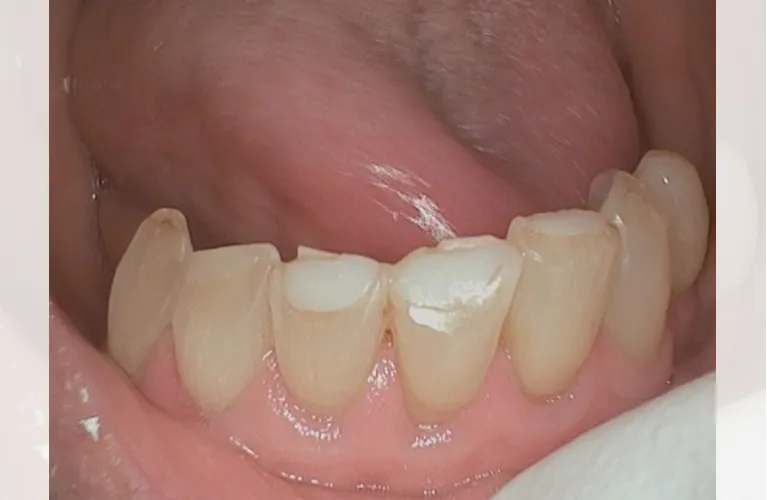
Gum recession reduce teeth grinding
The excessive force exerted during teeth grinding can cause gum recession, where the gum tissue pulls away from the teeth, exposing the roots. This can lead to tooth sensitivity and an increased risk of tooth decay.
If you suspect that you have or are experiencing any of these symptoms, it is recommended to consult with a dentist or healthcare professional for a proper diagnosis and appropriate dental treatment and options.
Causes Of Bruxism

Stress and anxiety:
Emotional stress and anxiety are considered significant contributors to bruxism. People may also grind your teeth or clench their teeth as a way to relieve tension or cope with stressful situations.
Malocclusion
Misalignment of the teeth, known as malocclusion, can lead to bruxism. When the upper and lower teeth do not fit together properly, it can cause excessive grinding or clenching.
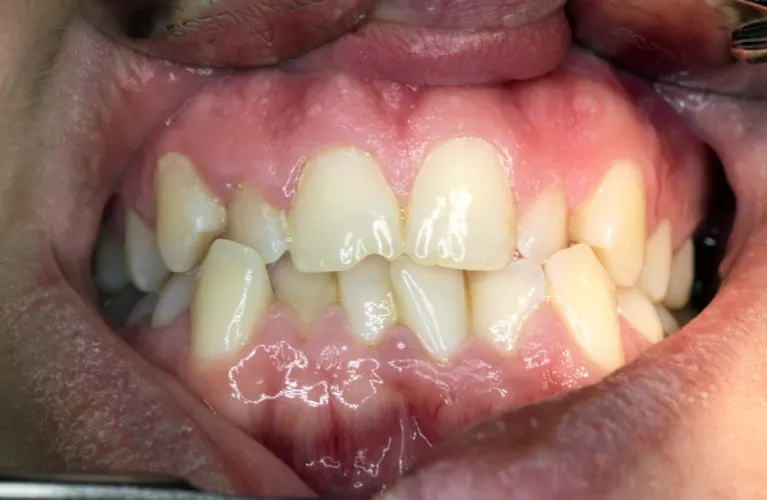
Sleep disorders
Bruxism is a sleep related movement disorder often associated with other sleep disorders too, such as obstructive sleep apnea or snoring. Disrupted sleep patterns and breathing difficulties during a sleep related bruxism or an obstructive sleep apnea related movement disorder can increase the likelihood of teeth grinding.
Medications and substances
Certain medications, such as antidepressants or stimulants, have been linked to bruxism as a side effect. Additionally, the excessive use of caffeine, alcohol, or recreational drugs may contribute to teeth grinding.
Lifestyle factors
Lifestyle habits, such as excessive alcohol consumption, smoking, or consuming stimulating substances like caffeine, can increase the risk of bruxism.
Psychological factors
It has been associated with certain psychological conditions, including aggression, frustration, or a type A personality. People with these traits may be more prone to teeth grinding.
Maladaptive coping mechanisms
Individuals who have difficulty coping with stress or expressing their emotions may resort to bruxism as a maladaptive coping mechanism.
Genetic factors
There may be a genetic predisposition , as it can run in families. However, more research is needed to fully understand the genetic links to this condition.
Risk factors of Bruxism
These factors increase your risk :
Stress
Increased anxiety or stress can lead to teeth grinding. So can anger and frustration.
Age
It is common in young children, but it usually goes away by adulthood.
Personality type
Having a personality type that’s aggressive, competitive or hyperactive can increase risk.
Medications and other substances
It may be an uncommon side effect of some psychiatric medications, such as certain antidepressants. Smoking tobacco, drinking caffeinated beverages or alcohol, or using recreational drugs may increase the risk of bruxism.
Family members with sleep bruxism
It occurs in families. If you have a sleep disorder or sleep bruxism, other members of your family also may have sleep bruxism, or a history of it.
Other disorders
Bruxism can be associated with some mental health and medical disorders, such as Parkinson’s disease, dementia, gastroesophageal reflux disorder (GERD), epilepsy, night terrors, sleep-related disorders such as sleep apnea, and attention-deficit/hyperactivity disorder (ADHD).
Can children have teeth grinding?
Still, some children continue to grind their teeth until their teenage years. And regardless of age, teeth grinding in a children’s teeth can lead to:
- Headaches.
- Jaw pain.
- TMJ disorders(jaw clicking and other problems).
- Wear and tear on the teeth.
While stress is a loose teeth and teeth grinding harmful well, in adults, that’s not usually the case with children grinding loose teeth. Teeth grinding and bruxism in children may come from:
Misaligned teeth.
Mouth irritation.
Obstructive sleep disorder, apnea.
Heredity
How is bruxism diagnosed?
Dental Examination
A dentist will visually examine your teeth, looking for signs of tooth wear, chipping, or damage that may indicate bruxism. They may also examine your jaw joints and muscles for tenderness or abnormalities.
Medical History
Your dentist or healthcare provider will ask about your symptoms, medical history, and any medications you may be taking. It’s important to provide details about your dental habits, such as whether you grind your teeth or clench your teeth during the day or night.
Symptoms Assessment
The dentist will inquire about common bruxism symptoms you may experience, such as jaw pain, headaches, facial or jaw pain sometimes, or tooth sensitivity. They will also ask if anyone has observed the same grinding noises or clenching sounds during your sleep.
Sleep Evaluation
Since many people with bruxism grind their teeth during sleep, your dentist may recommend a sleep evaluation. This can involve an overnight sleep study called polysomnography, which monitors various physiological parameters while you sleep, including muscle activity in the jaw.
Electromyography (EMG)
EMG measures the electrical activity of muscles. In some cases, your dentist may use EMG to evaluate the muscles involved in jaw movement and detect any abnormal muscle activity associated with bruxism.
Portable EMG Recording Device
In the 1970s, sleep bruxism episodes were monitored at home using battery-based electronic monitoring equipment [40]. The portable EMR record is easy to use. Criteria to assess the sleep bruxism with portable electronic monitoring devices are proposed [41] but their validity has never been verified.
Bite Analysis
A bite analysis, also known as occlusal analysis, may be conducted to evaluate the alignment of your teeth and how they come together when you bite or chew. This analysis helps identify any bite abnormalities or imbalances that may contribute to bruxism.
Sleep bruxism can sometimes be self-diagnosed based on the presence of symptoms and observations from others, such as a sleeping partner who notices teeth grinding sounds. However, seeking professional evaluation and diagnosis diagnosis is important for proper management and treatment recommendations.
What Are the Treatments for Sleep Bruxism?
Sleep bruxism, which refers to the habit of grinding or clenching the teeth and sore jaw during sleep, can be a challenging condition to treat. While there is no definitive cure for sleep bruxism, several treatment options can help manage the symptoms of sleep bruxism disorder and reduce the potential damage to the teeth and jaw. Here are some common treatments:
Mouthguards or Splints
A dentist can create a custom-fitted mouthguard or splint to be worn during sleep. These devices provide a barrier between the upper and lower teeth, preventing them from grinding against each other and reducing the impact on the jaw joint.

Medications
In some cases, medications may be prescribed to both sleep medicine alleviate the symptoms associated with sleep bruxism. Muscle relaxants can help reduce muscle activity during sleep bruxism, while antidepressants or anti-anxiety medications may be used to both sleep medicine address underlying stress or anxiety contributing to sleep bruxism.
Stress Management
Since stress and anxiety are often associated with sleep bruxism, finding ways to manage stress can be beneficial. Techniques such as relaxation exercises, meditation, counseling, or therapy may help reduce and symptoms.
Dental Corrections
If misaligned teeth or other dental issues contribute to bruxism, dental treatments like orthodontic work, crowns, or dental restoration procedures may be recommended to correct the underlying dental problems.
Lifestyle Modifications
Certain lifestyle changes can help ease bruxism symptoms. These include avoiding stimulating substances like caffeine and alcohol, establishing a regular sleep routine, practicing good sleep hygiene, and avoiding activities that strain the jaw muscles (e.g., chewing gum).
Behavioral Therapy
Sometimes, behavioral therapies like biofeedback or cognitive-behavioral therapy (CBT) may help identify and address the triggers and patterns associated with bruxism. These therapies aim to change behavior and reduce stress levels.
It is important to consult with a healthcare professional or dentist to determine the most suitable treatment plan for your specific case . They can evaluate your symptoms, identify any underlying causes, and recommend interventions.
FAQ
What is the main cause ?
It often has an association with stress, anxiety, which causes teeth grindings the most commonly. Sleep disorders include snorting or sleep apnea. Take medications that may inhibit serotonin production (SSRIs) and other neurotransmitters in the body.
How serious is bruxism?
Chronic grinding or tooth grinding is known as bruxism but can result in a range of health issues. Your teeth can fracture, requiring crowns and implants. Eventually, you will lose your enamel if your teeth are damaged and you can lose healthy tooth structure.
Is bruxism part of anxiety?
Wake bruxises are caused by emotion, including stress or anxiety, and are triggered in the body through anger. Or maybe this is an effective response to an intense focus situation. Sleepbruxism may cause sleep-induced chewing activity, which causes arousal during sleep.
What deficiencies cause bruxism?
Conclusion: Sleep bruxism was associated with vitamin D deficiency and poor intake of calcium. It is also important to examine whether vitamin D or calcium supplements may relieve insomnia.
What is the difference between bruxism and clenching?
Bruxism, or grind, involves movement of jaws with teeth attached. Usually dentists notice significant noticeable tooth wear, and flattening of the teeth in bruxism. Clenched teeth are just a way to move jaw muscles to put together the bones to stop teeth grinding and tighten the jaw muscles.
How do I stop my bruxism?
Lifestyle & house remedies reduce stress. Listen to music and take hydration can help to calm you down. Ensure no stimulants during the day. … Ensure proper rest. The sands of the sea are not very good. Talk about putting yourself down. … Get an annual dental examination.
How do you get rid of bruxism?
This Self-care Step might help stop Bruxism and reduce stress. … Avoid stimulants at night. … Make sure you are sleeping well. … Bring in another person. … Plan dental exams.
How do you fix bruxism?
It can help reduce bruxism – reduce stress. ‘ Do not smoke at night. … Make sure you’re sleeping properly. … Bring a sleeping companion. … Make dental checkups regularly.
What is the meaning of to be clenching?
The key is to stay steady. close tight. Cinch your jaw locking all your teeth tightly. Hold your hand tight.
What is an example of clenching?
It was just a matter of time before the man started to smile. He was angry. She became angry with the way she spoke with tight teeth.
What is a synonym for clenching?
Definitions of contractions This page provides more than 50 synonyms and antionyms for words that are derived from “clench”: gripping, clutch gripping clinching, constricting and contracting.
What happens if bruxism is not treated?
If bruxism is not treated then the jaw can become mushy or painful. This is called Temporomandibular Disorder, or TMJ. It can cause you tooth loss.
How does anxiety cause bruxism?
In the morning, bruxism can accompany anxiety and frustration. People grind their teeth during work, but they might unconsciously cut off the teeth or grind their teeth when they’re under intense stress. In such cases stress reduction techniques can be beneficial, including meditation.
Do dentists treat bruxism?
The dentist will diagnose tooth wear, and treat the tooth wear and grinding problems quickly so dental pain and the damage will not continue for longer. Treat other dental issues that can cause a missing tooth.
Is bruxism a medical or dental issue?
Bruxism is unambiguously both an orthopaedic and dental condition – i.e. This disease has many different possible forms weaved in genes, lifestyles, drugs and usages, personality and vitamin deficits, sleep cycles and neurological strands.
Why am I clenching at night?
Why are there signs of bruscivism? Dental doctors often point to excessive stress as a cause of severe bruxism sometimes. In some cases,Bruxalism causes central nervous system reactions like pain and anger. A lot of people are affected by it because of aggression, hurriedness, and excessive competitive tendencies.
Why do I clench my teeth when falling asleep?
Teeth grinding is a deliberate and often unconscious tooth grinding habit that occurs when a patient is sleeping. The reasons can be stress, concentration and drug abuse. Surgical options include bites splint limbs used nightly, repairs to damaged or missing teeth & stress management therapies for aging.

